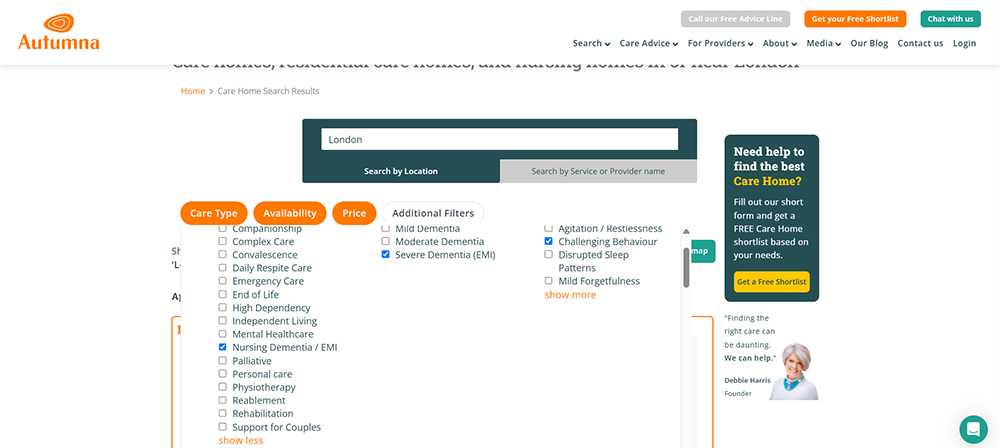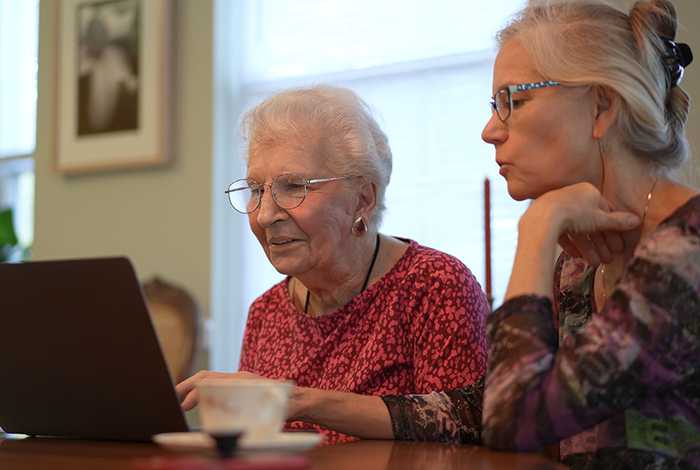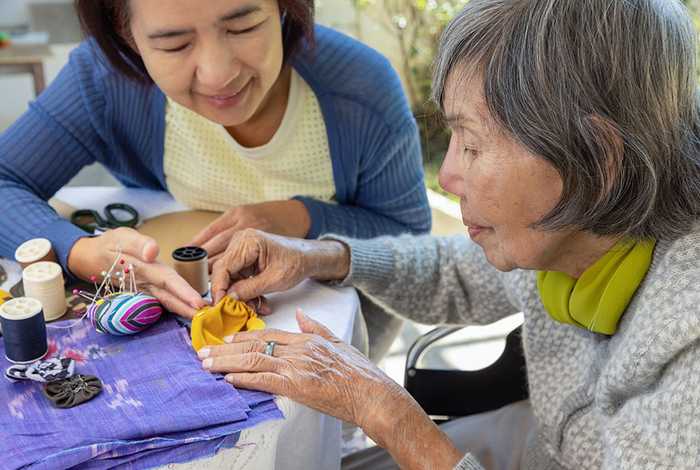Posted by Janine Griffiths
What is EMI nursing care?

If you’ve ever asked the question, “what is EMI nursing care?”, you’re not alone. It’s not exactly a question that rolls off the tongue and it’s certainly not one most of us expect to come across when we’re simply trying to find the right kind of support.
But for many people looking into care options, especially for loved ones living with dementia or complex mental health needs, this phrase can start popping up in conversations with professionals or during online searches. And naturally, it can leave you feeling confused or even a bit worried.
So let’s take a breath. This blog is here to gently unpack what EMI nursing care actually means. No complicated medical speak. No cold, clinical tone. Just a clear, compassionate guide to help you understand it. Whether you're planning for your own future or looking on behalf of someone close to you, knowing what this kind of care involves could help you feel more in control, more informed, and less alone in the process.
You don’t need to be an expert to make the right decision, you just need the right information, explained with kindness. That’s exactly what we’re here to offer.
What EMI actually means and why it matters
It’s easy to feel a little unsure when unfamiliar terms start appearing in your care search. EMI is one of those phrases that might seem vague or even a bit outdated, yet it still comes up often in conversations around specialist care. So, what is EMI nursing? And why does it matter when you’re looking for the right support?
EMI stands for Elderly Mentally Infirm, a term that’s been around for some time. While it’s not commonly used outside of the care world, it’s still very much in circulation within care settings - particularly when describing certain types of nursing care for older adults. In most cases, EMI relates to people over the age of 65 who are living with more advanced stages of dementia, Alzheimer’s, or other complex mental health needs that require a higher level of support.
You’ll often see references to EMI nursing homes or EMI units. These are places that are specifically designed to provide tailored care for people whose needs go beyond what’s offered in standard residential or even general dementia care.
It’s important to remember that EMI does not mean someone is incapable - it simply recognises the need for extra, specialist care, to support a person’s wellbeing, safety and dignity. It’s about providing the right care in the right environment, with people who understand how to meet those more complex needs with compassion.
What makes EMI nursing care different?
Choosing care isn’t just about ticking boxes - it’s about finding something that truly fits. For anyone asking, ‘what is EMI nursing’, it helps to first understand how this specialised care differs from more general support.
EMI nursing care offers a higher level of clinical and emotional support, designed specifically for older adults who are living with complex needs tied to advanced dementia or serious mental health conditions. While many residential homes offer excellent care, EMI nursing provides something extra - often 24/7 nursing oversight, more frequent monitoring, and environments that are thoughtfully designed to help reduce anxiety or confusion.
One of the most meaningful differences is the way EMI care teams are trained. These professionals understand how to respond with calm and kindness to behaviours that might otherwise feel overwhelming - things like distress, agitation or wandering. The goal is always to support the individual in a way that feels safe, respectful, and reassuring.
There’s often a higher staff-to-resident ratio too, which means more time for personalised care. That’s what makes EMI nursing care not just different, but truly tailored, a deeper level of support for those who need it most, delivered with patience and heart.
EMI nursing vs dementia care – what’s the difference?
It’s easy to assume that all dementia care is the same, but there are different levels of support depending on a person’s needs. This is often where people start asking themselves, what EMI nursing is and how it differs from general dementia care.
The truth is, while both types of care are focused on supporting those living with dementia, EMI nursing care is more specialised. Dementia care might be provided in a residential setting, offering help with day-to-day life, gentle routines, and emotional support. For many, this is just the right amount of care.
But when dementia progresses and symptoms become more complex, such as adverse changes in behaviour, physical frailty, or the need for ongoing medical supervision, EMI nursing care steps in. It’s a specific kind of nursing care, designed for those whose needs have moved beyond what traditional dementia care can comfortably manage.
Think of it like a deeper layer of support. Where dementia care lays the foundation, EMI nursing builds upon it with round-the-clock clinical oversight and a more tailored approach to mental health. It’s important to know that not everyone with dementia will need EMI care but for those who do, it can offer safety, dignity, and reassurance during a more vulnerable stage of life.
Who might need EMI nursing care?
It’s not always easy to know when the time is right for a different kind of care. You might be managing at home, perhaps with some support, and wondering if it’s enough. Or you may be watching someone you love go through changes that feel hard to explain or cope with. This is often when the question arises: what is EMI nursing, and is it something to be thinking about?
When someone starts experiencing intense confusion, frequent distress, wandering, or behaviours that feel unpredictable, it may be a sign they need more specialist support. This can be particularly true when health conditions start overlapping, or when safety becomes a growing concern.
Often, the need for EMI nursing care is identified during a professional assessment, such as a Care Act Assessment. These assessments help build a clear picture of what kind of support someone needs to live not just safely, but with dignity and peace of mind.
It’s never about giving up, it’s about finding care that truly fits, especially when things become overwhelming to manage alone. EMI nursing care is there for those moments, offering not just clinical support, but the understanding and calm that can make a world of difference.
Finding EMI nursing care that feels right
Looking for care is never just about what’s available, it’s about what feels right. And when you start asking the question ‘what is EMI nursing?’, that’s often the beginning of a more focused search for care that’s equipped to meet more complex needs.
EMI nursing care is a specific type of care home registration, so it’s important to know that not every care home will offer it. That’s why narrowing down your options can be helpful and empowering. You’re not just looking for a place, but for a team who truly understands how to support someone with advanced dementia or mental health needs, with compassion, patience and experience.
Look for homes where staff are specially trained to manage more complex behaviours with calm and confidence. A good EMI setting should feel secure but never institutional. It should feel safe, warm, and human, because that’s exactly what people deserve, whatever stage they’re at.
Don’t be afraid to ask questions, listen to your gut, and explore your options fully. Autumna’s search tools can be a helpful place to begin, guiding you toward EMI-registered care homes that match your needs. Finding the right care shouldn’t feel like guesswork, it should feel like a step toward peace of mind.
Funding and assessments – what you should know
When thinking about care, the practical side of things can sometimes feel like a mountain of paperwork and uncertainty. But it doesn’t have to be. Once you start understanding what EMI nursing is and whether it might be the right fit, the next step is to get clear on how it’s funded and what kind of support is available.
EMI nursing care can be paid for privately, or funded through your local authority depending on your individual circumstances. The first step is usually a care needs assessment, which looks at the level of support required. This is often followed by a financial assessment to determine if you’re eligible for funding help.
In some cases, EMI nursing care may also qualify for NHS Continuing Healthcare, which covers the full cost for those with more serious health needs.
If it’s all feeling a bit much, that’s completely normal, but you don’t have to figure it out alone. Autumna offers clear, step-by-step guidance and tools to help you make sense of it all. For more information, contact our advice team on 01892 335 330. They are here to answer your questions 7 days a week.
Closing thoughts
If you’ve ever been confused about what EMI nursing is and what it isn’t, hopefully, you now feel a little more confident in what it means and how it could support someone you love. The world of care can sometimes feel full of complicated terms and tough decisions, but underneath it all, it’s really about one thing: finding the right help at the right time.
EMI nursing care exists to meet people where they are to provide specialist support when needs become more complex, and to do so with care, dignity, and understanding. It’s there to offer calm in the chaos, reassurance in the unknown.
If you’re still feeling unsure, or just need someone to talk things through with, support is always available. Autumna can help you explore your options, fast-track care searches, or offer one-to-one advice if that feels more manageable. Whatever stage you’re at, you don’t have to navigate it alone.
Looking for an EMI nursing care home?
If you are looking for a nursing care home, Autumna can help. Just head over to the search bar on our website and select ‘care home.’ You can then type in your location.
A list of search results will then pop up. In the tabs above the search results, select care type.
Available options on desktop and mobile include Residential, Nursing, Dementia, and Respite care.
If you are on desktop, you will also be able to select ‘Nursing Dementia/EMI’ under ‘Care Given’, which you will find listed under the 'Additional Filters' tab. You can also select the specific type of dementia care you need, by selecting ‘Dementia Category’, ‘Dementia specialisms’, or ‘Nursing specialisms’, under the ‘Additional Filters’ tab.
Since EMI nursing care typically focusses on those with more advanced or challenging behaviours, selecting ‘severe dementia’ under ‘Dementia Category’, and ‘challenging behaviour’ under ‘Dementia Specialisms’ will ensure that you get the help that your loved one needs.

You may also find it easier to use our shortlisting tool which can do all of the hard work for you.
Just answer a few quick questions, and the tool will do the rest! You will then see a list of even more personalised suggestions created with your unique circumstances and needs in mind.
Receive a Free Care Home Shortlist!
Let our expert team of advisers get your search off to a great start.
Tell us a little about your needs and we'll send you a bespoke shortlist of care homes! Click the button below to begin, it takes just a few minutes.
Other articles to read
From the blog

Older Persons Care Advice
Ultimate guide to jointly owned property and care home fees
September 26th, 2025
Understand jointly owned property and care home fees, how assessments work, and steps to protect your finances and plan ahead with confidence.

Older Persons Care Advice
What are the pros and cons of care homes?
September 26th, 2025
Weigh the pros and cons of care homes to make the right choice for you or a loved one. Discover benefits, challenges, and tips for finding the best fit.

Older Persons Care Advice
Person centred care and dementia: A guide for families
September 23rd, 2025
Discover how person centred care and dementia support go hand in hand. Learn practical tips, expert insight, and guidance for families seeking the best care.
Frequently Asked Questions
Not exclusively, but dementia is the most common reason someone may need EMI nursing care. EMI (Elderly Mentally Infirm) care is designed for older adults with complex mental health needs, including severe anxiety, psychosis, or behavioural disorders that require both emotional and clinical support. However, it’s most often used for people with advanced stages of dementia, especially when symptoms include unpredictable or challenging behaviours.
Yes. Many individuals begin in standard dementia care settings but transition into EMI nursing care as their needs become more complex. This might happen when symptoms worsen, behaviour becomes more difficult to manage, or clinical supervision is needed around the clock. A professional assessment will help determine when and if this transition is appropriate.
Look for care homes that are registered to provide both dementia and nursing care with a specialist focus. On platforms like Autumna, you can filter results by selecting ‘Nursing Dementia/EMI’ under ‘Care Given’. It's also helpful to ask directly about staff training, care approaches, and whether they have experience managing advanced dementia or complex behaviours.
Ask about staff ratios, training in mental health and dementia, how they manage challenging behaviours, and how care is personalised. It's also important to observe the atmosphere - does it feel calm, respectful, and safe? Ask whether they involve family in care plans, and if residents are given meaningful daily activities suited to their needs.
The UK's largest & most detailed directory of elderly care and retirement living options
10,318
Care Homes
11,950
Home Care Services
1,657
Live-in Care Services
1,756
Retirement Living Developments
Autumna is the UK's largest and most comprehensive later-life living & elderly care directory. Our detailed search facility and team of expert advisors can help you find the best care homes, nursing homes, retirement homes, retirement villages, home care, and live-in care services for you or your loved one's needs. Our website is free to use, we are proudly independent, and we never take referral fees.






